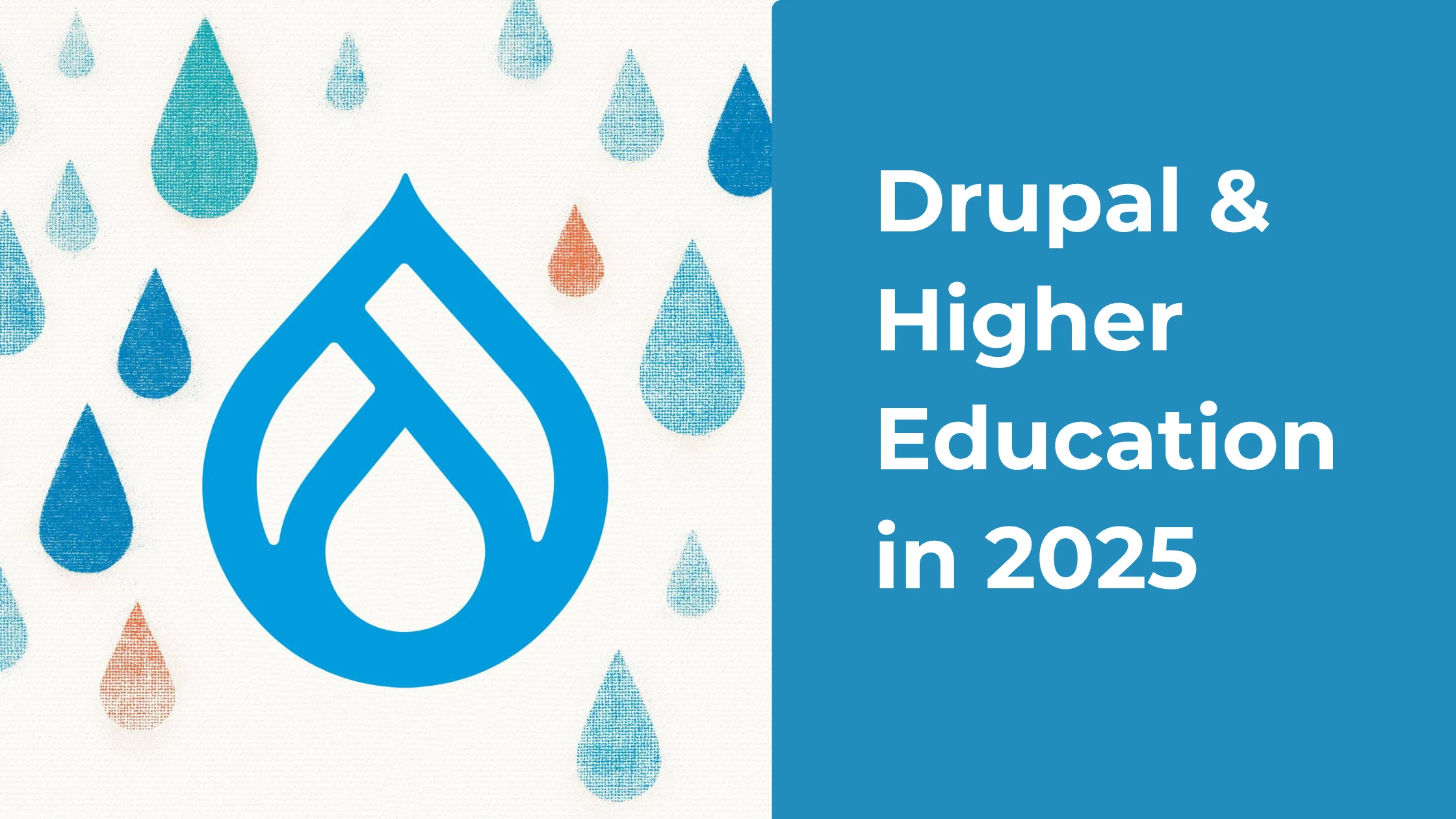Why Drupal for your site in 2025
At iFactory, we’ve worked with many content management systems over the years. When it comes to open-source content management systems, WordPress can be a fantastic solution, even for complex sites, due to its flexibility, extensive plugin ecosystem, and user-friendly interface. That said, Drupal holds a special place in our hearts.
Why? Because of its amazing open-source community. That, and to quote our partners at Pantheon, “Drupal functions as an agile business driver for organizations with complex data relationships and evolving digital strategies. Its modularity gives you freedom within a framework, letting you customize without piling up technical debt.”
While we believe Drupal is an exceptional choice for complex digital ecosystems, it’s important to recognize that it’s not a one-size-fits-all solution. The platform’s strength lies in its ability to be molded for specific, demanding requirements, which often involves more development expertise than an out-of-the-box system. Institutions that prioritize ultimate flexibility, granular security control, and long-term scalability will find Drupal’s structure to be a strategic asset. Conversely, some teams might find the power of Drupal to be more than they require. The key is aligning the tool with the ambition.
After working on several large-scale Drupal 10 and Drupal 11 projects this year, we wanted to share why now is the perfect time to consider Drupal for your next project, especially if you’re in higher education, where scalability, security, and collaboration are essential.
Drupal: A CMS Built to Innovate and Scale
Drupal’s reputation as a powerful, open-source CMS is well-earned. Trusted by global organizations like NASA, and Pfizer, it delivers security, scalability, and flexibility that few platforms can rival. While some CMS platforms focus on simplicity, Drupal empowers organizations to tackle complex content structures, multisite management, and specialized workflows.
For higher education, this means Drupal isn’t just a CMS, it’s a strategic tool that adapts to your needs. Whether managing a single university site or a large multisite network, Drupal ensures you’re ready to grow without sacrificing performance, security, or usability.
Drupal functions as an agile business driver for organizations with complex data relationships and evolving digital strategies. Its modularity gives you freedom within a framework, letting you customize without piling up technical debt.”
Pantheon
Why Drupal is Excellent for Frameworks in Higher Education
Higher Education Frameworks are libraries of pre-built, reusable components and visual building blocks that allow schools, departments, offices and centers to quickly create websites that are visually consistent, accessible, and aligned with university branding standards. Frameworks are typically designed to be no-code-required (or low-code), making it accessible to a wide range of users and enabling rapid website development without sacrificing quality.
Frameworks can be game-changers for higher education institutions. While the upfront cost can be steep, having a system that keeps your sites accessible and secure, and your institution’s brand consistent, can save your school a significant amount of money in the long run.
Frameworks streamline the website development process by providing reusable components, tools, and a standardized foundation that reduces both time and costs, all while ensuring consistency across multiple websites. Development resources and budgets can then be focused on enhancements and new functionality to meet changing content needs.
Here are two standout examples of Drupal-powered frameworks in higher education:
- YaleSites Framework: Built on Drupal, YaleSites provides a robust foundation for creating and managing websites across Yale University’s departments and units. By leveraging this framework, the university ensures brand consistency, accessibility, and scalability, all while saving time and resources on development.
- Rutgers Core Component Library (RCCL): Rutgers University’s Drupal-based RCCL framework delivers pre-built, reusable components that simplify website creation while maintaining alignment with the university’s branding and accessibility standards. This approach supports rapid development without compromising quality.
By adopting frameworks like these, higher education institutions can centralize their digital systems, reduce redundancy, and focus their resources on content and innovation.

Community and Drupal Web Design
Drupal’s technical capabilities are outstanding, but one of its greatest strengths lies in its community. At the heart of this ecosystem is Drupal.org, the central hub for everything Drupal. This platform connects developers, designers, and organizations, offering tools, documentation, and a treasure trove of contributed modules and themes. Drupal.org is a testament to the collaborative spirit that drives Drupal’s innovation and success.
Technical Innovations in Drupal Web Design
- Improved Media Management: Drupal has introduced enhanced media handling capabilities, making it easier to manage images, videos, and other media assets directly within the CMS. Additionally, it now integrates easily with enterprise digital asset management tools.
- Enhanced Layout Builder: Drupal’s Layout Builder has been refined to make it even easier for content creators to design pages visually, without needing dev
- Drupal AI: The Drupal AI module provides a framework for integrating Artificial Intelligence on any Drupal site.
Web Design Spotlight: Drupal Project Browser
One of the most exciting recent developments in the Drupal ecosystem is the Project Browser. This user-friendly tool, designed to simplify the process of finding and installing modules, lowers the barrier to entry for new users while saving time for experienced developers. With the Project Browser, you can:
- Search for modules directly within the Drupal interface.
- Access detailed descriptions, reviews, and compatibility information for each module.
- Install modules without needing to leave your site or touch the command line.
Additionally, Project Browser is co-built and being maintained by our friends and partners at Redfin Solutions.
Choosing the Right Hosting for Your Drupal Website
Drupal’s potential is amplified when paired with the right hosting provider. Powerhouse hosting platforms such as Acquia, Pantheon, and Platform.sh are purpose-built to bring out the very best in Drupal, offering unmatched performance, scalability, and developer-friendly tools.
- Acquia: A leading Drupal hosting provider, Acquia delivers enterprise-grade tools for managing multisite networks, optimizing performance, and ensuring top-tier security.
- Pantheon: Known for its advanced web operations platform, Pantheon simplifies Drupal site management with automated workflows, built-in caching, and a focus on speed and reliability. It’s a favorite for developers seeking efficiency and scalability.
- Platform.sh: Designed for modern development workflows, Platform.sh provides a powerful, container-based hosting environment that allows developers to build, test, and deploy Drupal projects with ease. Its scalability and flexibility make it an excellent choice for organizations with dynamic needs.
These hosting providers not only enhance Drupal’s technical capabilities but also ensure that your site remains fast, secure, and ready to handle the demands of your audience.
Why Partner with iFactory for Drupal Web Design Project
At iFactory, we craft solutions tailored to your unique goals. Whether you’re a university looking to adopt a framework or a sharpen your online presence and strengthen user engagement, our team of Drupal experts is here to help.
Here’s what makes iFactory your ideal Drupal partner:
- Deep Higher Ed Expertise: We understand the challenges faced by higher education institutions, from managing decentralized departments to ensuring accessibility and brand cohesion. Our work with Drupal frameworks demonstrates our ability to deliver tailored—but scalable and maintainable—solutions that meet these needs.
- Deep Strategy, Information Architecture and Design: We specialize in clarifying strategy and architecting and designing projects that align with your brand, goals, and audience. The result? A website that feels uniquely yours, and that you can maintain.
- Ongoing Support: A website is a long-term investment, and we’re here to support you every step of the way. From regular updates to performance monitoring, SEO optimization and content auditing we ensure your Drupal site remains secure, optimized, and future-ready.
If your institution is ready to embrace a platform built for innovation, collaboration, and growth, now is the time to choose Drupal, and iFactory is here to help.
We’ve helped higher education institutions create meaningful digital experiences and build brighter futures for over 30 years.
Let us know if you want to talk about Drupal, WordPress, or anything else that’s keeping you up at night at hello@ifactory.com.
Frequently Asked Questions About Drupal Web Design
Drupal stands out for its exceptional flexibility, robust security features, and ability to handle complex data relationships. It’s particularly powerful for organizations with evolving digital strategies, offering modularity that allows customization without accumulating technical debt. Unlike simpler CMS platforms, Drupal provides enterprise-level capabilities for managing large-scale websites and complex digital ecosystems.
Yes, Drupal is excellent for higher education websites because it offers can be used to create flexible frameworks. Major universities like Yale and Rutgers use Drupal-powered frameworks to maintain consistency across multiple department websites while ensuring security and scalability.
Drupal typically requires more development expertise than out-of-the-box SaaS systems. While its power lies in its flexibility, organizations should be prepared to invest in experienced developers or partner with a qualified Drupal agency to fully leverage its capabilities. This is especially true for complex features and custom implementations.
Recent Drupal innovations include enhanced media management capabilities, an improved Layout Builder for visual page design, and the new Drupal AI module for artificial intelligence integration. These features make content management more intuitive while maintaining Drupal’s powerful enterprise capabilities.
The top hosting providers for Drupal websites are Acquia, Pantheon, and Platform.sh. These platforms are specifically optimized for Drupal and offer features like automated workflows, built-in caching, and advanced security measures to ensure optimal website performance.


